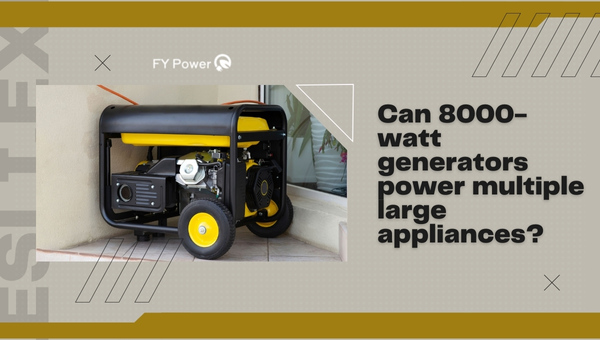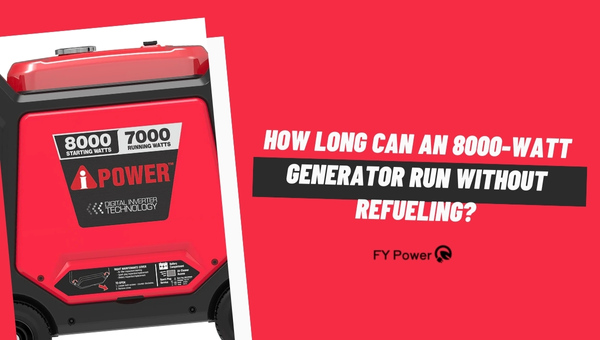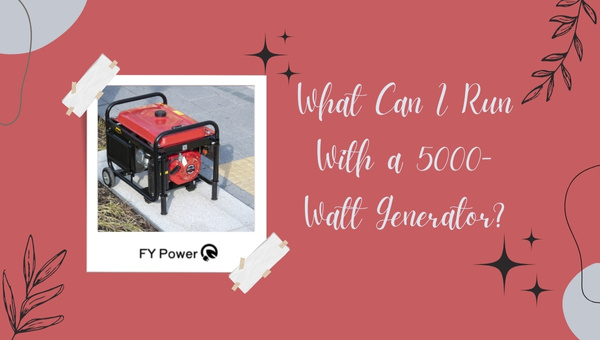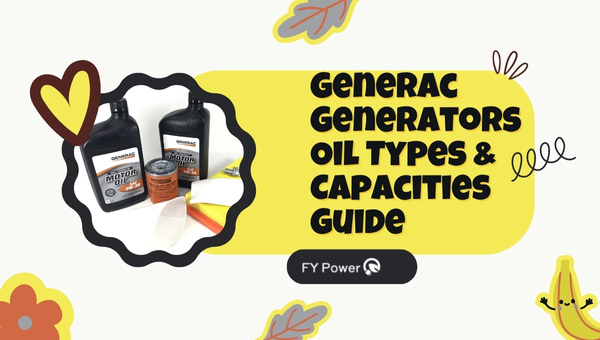Imagine the day when a powerful storm strikes, leaving you without electricity. What’s your plan? Enter the 8000 watt generator an often overlooked piece of equipment that can power a variety of appliances in your home or on job sites.
This article will guide you through what will a 8000 watt generator run, from essential household items to heavy-duty tools, with precision and accuracy. We’ll also discuss safety precautions, help you decide between standard and inverter generators, and explore additional features to consider.
Whether it’s keeping your central air conditioning running during a sweltering summer blackout or powering a well pump in remote locations, understanding your wattage requirements is vital. It’s not just about weathering storms; it’s about belonging to a community that values preparedness and self-reliance.
So let’s illuminate this topic together!
Key Takeaways
- An 8000 watt generator can power a variety of appliances in your home or on job sites, including small window AC units, fridges with freezers, washing machines, and electric water heaters.
- Wattage requirements, including running watts and starting watts, need to be considered for accurate estimation of power needs.
- Safety precautions, such as not connecting the generator directly to the home’s electrical system without a qualified electrician and not operating the generator indoors or in enclosed spaces, are important to prevent accidents and carbon monoxide poisoning.
- When choosing a home generator, consider factors such as fuel type, starter system, alternative fuel sources, and extra features for convenience and functionality.
Determining your Wattage Requirements
To truly understand what your 8000 watt generator can handle, you’ll need to figure out your home’s specific wattage requirements – it’s not as complex as it sounds, and trust me, it’ll give you peace of mind in the long run.
You start by listing all the electronic appliances you’d like to run during a power outage. Then, examine their name tags for required running and starting watts; jot these down into a table for easy reference.
Wattage calculation is crucial here. Add up all the running watts of your appliances. If this total falls within the 8000 watts limit of your generator, then you’re on the right track towards power efficiency.
But wait! There’s more to consider: Starting or surge watts. Find the appliance with the highest additional starting watts and add this number to your total running watts. This will give you an accurate estimate of what your generator needs to provide.
Load management can be tricky if some appliances don’t have running watt data tags. But no worries! Remember Ohm’s law from high school physics: Watts = Volts x Amps? Use that equation or get an appliance load tester for precision.
Remember, understanding your wattage requirements ensures that when push comes to shove, you’re ready and capable!

What Can You Power With This Generator?
Like a reliable workhorse, an 8000-watt unit can handle most of your home appliances and power tools, from your humble coffee maker to the energy-guzzling electric water heater. This generator’s strength lies not just in its capacity but also in its fuel efficiency, which means it won’t drain your pocketbook while keeping your household running smoothly.
For visual clarity, here’s how some common appliances match up with an 8000-watt generator:
| Appliance | Wattage |
|---|---|
| Small window AC unit | 1,200 watts |
| Fridge with a freezer | 700 watts |
| Washing machine | 1,150 watts |
| Electric water heater | 4,000 watts |
The robustness of this generator does come with one caveat — noise levels. While they’re generally modest for such a powerful unit, it’s critical to perform regular generator maintenance to keep those levels down and ensure optimal performance.
Your trusty laptop or small heating system? No problem at all! Even larger tools like a radial arm saw are within reach. So whether you aspire to maintain normalcy during power outages or power up your RV adventure, an 8000-watt generator stands ready as your reliable partner.
Generator Safety Tips & Precautions
Ensuring your safety while using this powerhouse of energy is crucial, so let’s walk through some essential precautions you should always keep in mind.
As an initial measure, never connect a generator directly to your home’s electrical system unless a qualified electrician has installed it with the appropriate transfer switch. This rule applies universally, regardless of whether the structure is a house, office, or trailer.
The grounding necessity of your appliances cannot be overstated when plugged into the generator. Use cords supplied by the manufacturer or grounded extension cords. Regularly inspect these cords for any damage that might compromise their integrity and safety.
When dealing with electricity near damp or wet locations, ensure to use ground fault circuit interrupters (GFCIs) as they automatically shut off power when they detect current flow outside normal paths.
The risk of carbon monoxide poisoning presents another critical concern. Never operate your generator indoors or in enclosed spaces like garages since open windows and doors may not prevent CO accumulation. If CO poisoning symptoms appear, seek fresh air and medical attention immediately.
For fuel storage, keep containers away from heat-generating devices and flames, including cigarettes, lighters, and even the generator itself, for optimal safety management.
Will A 8000 Watt Generator Run A Central Air Conditioning?
Ever wondered if your 8000-watt powerhouse can handle a central air conditioning unit? The answer to this isn’t cut and dried. It all boils down to the unique specifications of your AC unit, as well as the generator’s fuel efficiency, noise levels, and overall lifespan.
To deduce whether your generator is up to the task, it’s crucial to consider these factors:
- LRA (Locked Rotor Amps): This figure indicates the current you can anticipate when full voltage is applied at startup.
- RLA (Rated Load Amps): This represents the maximum current a compressor should draw under any operating conditions.
- FLA (Full Load Amps): Essentially identical to Rated Load Amps but takes into account both compressor and fan units.
- Generator Specifications: These include its wattage capabilities, fuel efficiency, potential noise levels, and expected lifespan.
Remember that your central AC typically runs on a 208/240 volts system. To connect it safely with your generator, employ a transfer switch – this prevents damage to appliances or human harm during power backfeeding.
So before you hook up that generator to power an AC unit, check out those amps! Consult with professionals for precise guidance tailored specifically for you.
Will A 8000 Watt Generator Run A Well Pump?
Powering your well pump with an 8000W unit might seem as simple as pie, but it’s crucial to know the nitty-gritty details of your pump’s power requirements before you plug in. The type and size of your pump significantly influence its running and starting watts, thus impacting the Well Pump Efficiency.
| Running Watts | Starting Watts | |
|---|---|---|
| 1/3 HP | 750 | 1500 |
| 1/2 HP | 1000 | 2100 |
| 3/4 HP | 1500 | 3000 |
| 1 HP | 2000 | 4000 |
The above table provides rough estimates for different types of pumps. Remember, the issue isn’t running watts; it’s about ensuring that starting watts are adequately catered for. This knowledge will also help in Generator Maintenance since overloading can lead to damage.
By understanding these numbers, you’re considering Pump Lifespan Impacts – a key factor for long-term use. These figures may vary depending on voltage (120 or 240) and horsepower specifics found on your pump’s info-plate.
So, while an 8000W generator has the potential to run most well pumps efficiently, it is vital to check specific power demands to ensure smooth operation without sacrificing efficiency or lifespan.
Also Read: What Appliances Can Run With A 5000-Watt Generator?
Will A 8000 Watt Generator Run A Refrigerator?
With an 8000W unit, you’re more than equipped to keep your refrigerator humming along, even if it’s an older model that consumes a bit more juice. This capacity is especially beneficial during power outages when preserving food becomes crucial.
Let’s consider some key aspects related to refrigerator efficiency and generator sizing:
- Modern refrigerators consume around 300 – 400 watts of power, a load easily managed by your generator.
- Older fridge models may demand up to 1200 watts at the start-up but will drop down afterward.
- If your fridge comes with a freezer as well, you should add about another 80 – 100 watts.
- An inverter generator type is recommended to prevent any potential damage from high total harmonic distortion.
- Generator sizing is crucial for power outage preparation; undersized generators might fail.
While an 8000W generator can comfortably handle most residential fridges and freezers, always check the specific energy requirements of your appliances.
Remember, each watt counts when devising a practical contingency plan. So make sure you’re well-equipped and ready for any situation that requires an independent power supply on hand.
Will A 8000 Watt Generator Run An RV AC Unit?
Wondering if an 8000W power source can handle your RV’s AC unit? Well, the answer isn’t as simple as it might seem and depends on a variety of factors, so let’s dive deeper into this topic.
The capacity of your generator to run an RV AC unit hinges not just on the raw wattage it can produce but also on other variables such as your RV insulation efficiency. If your vehicle is well-insulated, less energy will be consumed in maintaining comfortable temperatures.
This means that even if you have a large 15000 BTU AC unit needing up to 3300 starting watts and 2000 running watts, a properly insulated RV could make an 8000W generator viable.
Generator fuel types also play a role here. Gasoline generators usually offer higher peak power while propane or diesel ones provide more stable running wattage over longer periods. Remember though, these are general guidelines; individual models may vary.
Understanding your RV power consumption involves knowing how much energy each appliance uses besides the AC unit – lights, fridge, TV etc., because all these are drawing from the same power source.
So yes, generally speaking, an 8000W generator should suffice for most RV air conditioning units along with other necessary appliances given efficient usage and adequate insulation within the vehicle.
Will A 8000 Watt Generator Run An Air Compressor?
Surely, you’d think an 8000W power source could easily handle a 1HP air compressor. However, it’s not that straightforward – the devil’s in the details and they’re quite shocking!
For instance, did you know that while running watts are important, starting watts can be almost three times higher? That’s enough to give anyone a jolt!
Now let’s delve into these numbers. A typical 1 horsepower air compressor requires about 1600 running watts but up to 4500 starting watts. This discrepancy is largely due to compressor efficiency at startup.
When your compressor first kicks on, it requires a significant surge of energy to overcome inertia and get everything moving – this is where those daunting starting watt figures come in.
Moreover, don’t forget about generator maintenance. An overworked generator runs the risk of failure or damage which could lead to costly repairs or replacement. Hence, ensuring your generator operates within its capabilities is crucial.
As for your air compressor’s power consumption, remember this equation: Watts (W or kW) = Volts (V) x Amps (A). Take note of these values from your equipment’s info plate for precise measurements.
So yes, an 8000W generator can run a 1HP air compressor but always consider starting wattage too – not just running wattage.
Will A 8000 Watt Generator Run A Sump Pump?
Thinking about powering your sump pump with an 8000W power source? Let’s dive into the specifics to see if it’s a feasible option. An 8000 watt generator should be more than capable of running a small, 1/2 horsepower sump pump, considering the rough estimates for its running and starting watts requirements.
Here is a quick breakdown:
| Sump Pump Horsepower | Running Watts | Starting Watts |
|---|---|---|
| 1/3 HP | 800 | 1300 |
| 1/2 HP | 1050 | 2150 |
The key here is not just the running watts, but also the starting watts. Your sump pump’s efficiency can greatly depend on this factor. Also note that you might need a 240V outlet on your generator.
If you’re open to exploring, there are efficient sump pump alternatives in the market that may require less power. The maintenance frequency of these pumps could also affect their electricity consumption over time.
Remember though, always check your pump’s info-plate for precise voltage, amperage and horsepower information before hooking it up to any generator. This helps ensure safe and effective operation. So yes, an 8000 watt generator can indeed run your sump pump without big issues!
Which Oil Is The Best For A 8000 Generator?
Choosing the right oil for your 8000 power unit can make a world of difference in its performance and longevity. Imagine this – it’s a chilly winter night, and you’ve got your generator powering your essentials, keeping you warm and cozy.
Suddenly, it starts to sputter and fails because you used an oil not suitable for colder temperatures! Avoid such mishaps by picking the right oil according to the engine type, climate conditions, fuel type, and brand reputation.
Understanding oil viscosity importance is crucial. For instance, SAE 30 is ideal for hotter climates, while SAE 10W-30 works best in colder ones due to its ability to maintain fluidity at lower temperatures.
Whether synthetic or conventional oils, both have their merits. Synthetic oils generally offer better performance at high temperatures and longer change intervals but come with a higher price tag.
Your decision should also consider how often you’re willing to change the oil; synthetic types allow more extended periods between changes compared to conventional ones. Moreover, ensure that the selected brand has reputable certifications as they are proof of quality testing.
Remember, thoughtful selection will ensure efficient operation within your community of generator users without unnecessary interruptions or damage due to improper lubrication choices.

How Many Amps Does A 8000 Generator Provide?
Curious about the amperage your 8000 unit can deliver? Well, understanding this is a key aspect of generator maintenance.
As a rule of thumb, an 8000 watt generator provides approximately 66.7 amps if you’re operating on 120 volts and around 33.3 amps for a supply of 240 volts.
Here’s what else you should know:
- The formula to calculate amperage is quite simple: Amps (A) = Watts (W or kW) / Volts (V). So in this case, just divide the wattage by the voltage.
- The fuel efficiency of your generator depends on how much power it’s supplying, which in turn depends on the amperage.
- Noise levels may increase with higher amperage as more power output could result in more vibration from your unit.
- Remember that different appliances require different amounts of amps, so knowing the capacity of your generator is crucial to avoid overloading.
- Always refer to your owner’s manual for precise instructions and safety guidelines regarding maximum load capacities.
So there you have it! Now remember to continuously monitor your unit’s amperage output as part of regular upkeep and enjoy efficient power generation at optimal noise levels without any hitches.
Also Read: Powering Possibilities: What Can a 7000 Watt Generator Run?
Should You Go For An Inverter Generator Or A Standard Generator?
As you consider your options between an inverter generator and a standard one, it’s vital to weigh the pros and cons of each.
Inverter generators, for instance, offer remarkable fuel efficiency, quiet operation, portability, and safe power supply for sensitive electronics. However, they typically have a lower output compared to traditional generators – usually not exceeding about 7,000 watts – which might limit their application in certain scenarios.
PROS OF AN INVERTER GENERATOR
You’ll love the benefits of an inverter generator, not only for its impressive power output but also for its high energy efficiency and quiet operation. These machines generate power with a much lower Total Harmonic Distortion (THD), making them safer for your sensitive electronics like laptops or mobile phones.
The inverter technology contributes to:
- Inverter Efficiency: They’re more energy efficient than traditional generators, consuming less fuel while providing the same power.
- Noise Levels: Despite their potent capabilities, they operate significantly quieter than their conventional counterparts.
- Fuel Consumption: Their lower fuel consumption makes them economical over time.
These compact yet powerful devices are perfect if you’re seeking a sense of community during outdoor gatherings or camping trips without disturbing the peace.
CONS OF AN INVERTER GENERATOR
Despite the many advantages, it’s crucial to consider the downsides of an inverter before investing. While they’re lauded for their fuel efficiency and lower noise levels, inverters come with significant drawbacks.
First off, they tend to be pricier than traditional generators. You might feel a pinch shelling out for them initially. Furthermore, their power output is limited; an 8000 watt generator can’t run everything indefinitely.
Inverter lifespan is another concern; repairs and servicing can prove costly over time. Plus, you have fewer fuel options available with these generators which may limit your flexibility during prolonged use.
Finally, while quieter than conventional generators, inverters still produce some noise that may be bothersome in certain environments or conditions. So weigh these factors carefully before making a decision.
Home Generator – Extra Features To Consider
When you’re on the hunt for that perfect 8000 watt home generator, don’t forget to check out those extra features – they can make a world of difference in convenience and functionality.
Always consider alternative fuel sources, like propane or natural gas, as backup when gasoline isn’t available. This isn’t just about flexibility but also fuel efficiency.
Pay attention to the starter system too. An electric start with manual recoil backup ensures convenient use by anyone, regardless of physical strength. For a smooth power supply without dangerous voltage fluctuations, aim for a generator with either an inbuilt inverter or automatic voltage regulation.
Furthermore, an automatic idle control feature can significantly reduce your fuel consumption while maintaining performance levels – a major plus for noise level considerations and eco-friendliness.
Maintenance procedures are simplified with an included maintenance-free electric battery and trickle charger. And let’s not forget safety measures such as spark arrestors and low-oil shutoffs, which can save you from potential fire hazards.
Look for durable frames, steel fuel tanks, and other user-friendly features like folding handles with wheel kits. These might seem trivial, but they add up to create that perfect blend of convenience and utility you need in your generator solution.
Also Read: What Will A 6500 Watt Generator Run? Explore The Power
Job Site Generator – Extra Features To Consider
In the realm of construction and job sites, it’s crucial to think about extra features that can bolster the efficiency and effectiveness of your power source.
For instance, opt for a diesel generator for fuel efficiency. Not only is diesel more commonly used in other machinery on site, making fuel management simpler, but generators running on diesel also tend to offer longer run times. This ties directly into avoiding downtime – every refueling period takes your generator out of service for some time.
Another important consideration is the maintenance schedule. Look for a generator with a large gas tank. While this might somewhat compromise portability, it will significantly increase your run time before needing to refuel.
In addition, consider automatic idle control or Eco Throttle/Smart Throttle systems for reducing noise levels. These features not only save on fuel costs but also reduce noise levels.
So remember, when you’re choosing a generator for your job site, don’t just consider the power output; take into account these additional features that could drastically improve your work efficiency and overall customer satisfaction while reducing operational costs over time.
Which Transfer Switch Is The Best For A 8000 Watt Generator?
Choosing the most suitable transfer switch for your 8000-watt powerhouse isn’t just about compatibility; it’s also about maximizing safety and efficiency. A well-matched transfer switch is indispensable to ensure that generator connectivity is seamless and reliable.
You should be looking at a switch with a capacity of 30-50 Amps to handle the load.
Transfer switch installation should always be performed by a professional electrician, as incorrect wiring could result in severe damage to both your generator and home electrical system. Appropriate cable size is crucial to prevent overheating and potential fire risks.
Switch durability is another key factor to consider. Your transfer switch will need to withstand constant power fluctuations without compromising performance or safety. Look for ones made from high-quality materials like steel or aluminum that can resist wear over time.
An automatic transfer switch (ATS) may be worth considering if you expect frequent power cuts. It automatically switches your power supply from the grid to your generator when it detects an outage, providing uninterrupted power supply.
Remember, choosing the right transfer switch is not only about ensuring smooth operation but also fostering a sense of belonging because we all want our homes safe, secure, and powered up whenever needed.
Frequently Asked Questions
What is the average fuel consumption of a 8000 watt generator?
Ever wondered about your generator’s fuel consumption? With optimal refueling times, an 8000 watt generator typically consumes around 1.2 gallons per hour. Fuel efficiency improvements can lessen the generator’s emissions impact, promoting environmental stewardship.
How to properly maintain an 8000 watt generator for long-term use?
Regularly perform generator cleaning, removing any obstructions from vents and outlets. Change the oil every 50 hours of operation or annually. Store your generator in a clean, dry area to protect it from corrosion and moisture.
How noisy is an 8000 watt generator compared to other sizes?
In comparing generator decibel ratings, an 8000 watt generator typically has higher noise levels. However, applying noise reduction techniques like utilizing acoustic enclosures can significantly lessen the sound, making it more bearable for you.
What are some common issues and troubleshooting tips for an 8000 watt generator?
Common issues with an 8000 watt generator include reduced lifespan due to overuse, fuel inefficiency, and engine wear. Troubleshoot safely, following manufacturer’s guidelines. Always check warranty details before servicing yourself to avoid voiding it.
Can a 8000 watt generator power multiple large appliances simultaneously?
Indeed, your 8000 watt generator can power multiple large appliances simultaneously. With proper generator placement, efficient power usage and backup planning, you’ll maintain a safe and reliable energy source for your home.
Conclusion
In the grand tapestry of power needs, an 8000 watt generator is your sturdy thread. It weaves through most appliances, powering them with ease.
But remember, safety first! Choose wisely between inverter and standard generators, and consider extra features based on whether it’s for home or job site use.
Lastly, don’t overlook the transfer switch, it’s the loom that holds everything together. Understand your wattage requirements to ensure a beautifully powered life!

